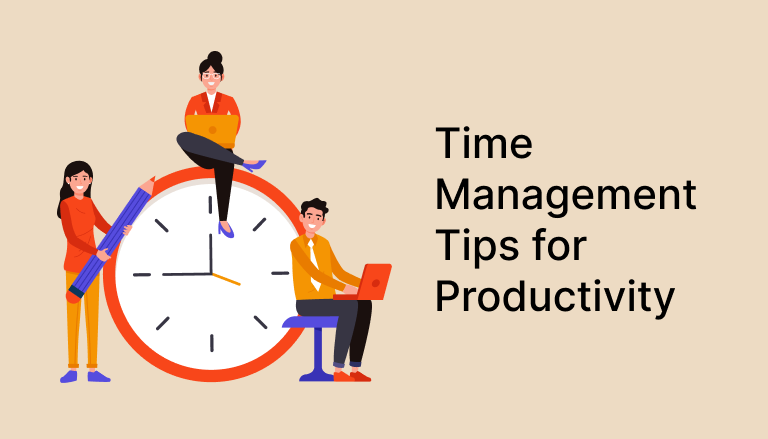We’ve all been there, facing a never-ending to-do list, feeling overwhelmed by deadlines, and wondering how to finish everything without burning out. If you’re struggling and asking yourself this question, “How to manage my time better,” and stay on top of your tasks, you’re not alone.
In fact, the global time management software sector is projected to reach $3.93 billion in 2025, growing at a rate of 17.5% annually. This booming demand shows just how critical it’s become for people everywhere to find smarter, more effective ways to manage their time.
In this blog, we’ll explore how to manage your time effectively at work and share actionable tips on how to manage your time better. By the end, you’ll have the tools to increase productivity and take back control of your day.
What Is Time Management?
Time management refers to the process of planning and organizing how to divide your time between different tasks. It involves setting priorities, creating schedules, and using your time efficiently to achieve specific goals. With effective time management, you can reduce stress, improve productivity, and make time for personal growth.
Stephen Covey, in The 7 Habits of Highly Effective People, said, “The key is not to prioritize what’s on your schedule, but to schedule your priorities.“ When you manage your time effectively, you take control of your tasks, not the other way around.
With distractions around every corner, learning how to manage your time is more important than ever. It keeps you focused, helps you hit your goals faster, and gives you more control over your day. So, let’s take a look at some benefits of time management.
Why Does Time Management Matter? The Surprising Benefits
Time management doesn’t just keep you organized, it can improve your mood and help you build better habits. If you’re curious about the unexpected perks, here’s a look at some you might not have thought of:
- Your Brain Craves Order (And Rewards You for It): In a disorganized environment, stress can build up quickly. When your schedule is packed, it’s tough to focus on what really matters.
- Trust Is Built in the Small Moments: Reliability is key in any workplace. Missing deadlines or being late can cause others to lose trust in you.
- The Joy of “Done” Becomes Your Motivation: Finishing tasks gives you a sense of accomplishment. It’s important to focus on making real progress, not just staying busy.
- Better Decisions Start With Pauses: Making rushed decisions can lead to mistakes. Taking time to think things through can save you from costly errors.
- You’ll Find Hidden Time: Tracking how you spend your day often reveals wasted time. Those little distractions add up!
- Your Future Self Will Appreciate It: Setting clear goals and breaking them into daily actions leads to real results over time. Your future self will thank you for staying on track.
Now that we know what time management really means, let’s dive into some practical tips and tricks to help you get the most out of your workday. These strategies can boost your productivity and make managing your time a lot easier.
What are These Time Management Tips and Tricks?
Managing your time well can do a lot more than just keep you organized, it can completely shift how you tackle your day and make you way more efficient. If you’re curious about time management tips that aren’t the usual go-tos, here are a few you might not have tried yet:
- First Things First: How to Spot What Really Matters
Not all tasks deserve equal attention. Learning to sort what’s truly important from what just feels urgent can change your entire workday. Try using the Eisenhower Matrix to sort tasks into four categories:
- Important and urgent (do these now)
- Important but not urgent (schedule these)
- Urgent but not important (delegate if possible)
- Neither urgent nor important (eliminate these)
For example, Prioritize urgent client requests over long-term projects, and schedule time for the latter.
This simple sorting method helps you focus on high-value activities instead of just putting out fires all day. When you know what matters most, decisions about where to spend your time become much clearer.
- Chunk it Down: Making Big Projects Feel Small
Large projects can feel overwhelming, which often leads to procrastination. Breaking them into smaller, manageable chunks makes them less daunting and gives you clear stopping points.
- For example, instead of “write report,” break it into: “outline main points,” “draft introduction,” “create first section,” etc.
- Each small win builds momentum and gives your brain little hits of satisfaction that keep you moving forward.
- The Focus Formula: One Task at a Time Wins the Race
Despite what many people claim, humans aren’t good at multitasking. Each time you switch between tasks, your brain needs time to refocus, and these small delays add up to major time waste.
- Instead, try single-tasking: give one task your complete attention until it’s done or until a planned stopping point.
- You’ll work faster, make fewer mistakes, and feel less mentally drained at the end of the day.
For example, Block time for emails, then switch to report writing, avoiding back-and-forth.
- Time Blocks: Reserve Your Hours Like VIP Appointments
Time blocking means scheduling specific chunks of time for certain activities, and treating these blocks with the same respect you’d give to a meeting with an important client.
- Set aside dedicated time for deep work, emails, meetings, and even breaks.
- This method helps prevent your day from being hijacked by minor issues and gives structure to your work hours.
- When you know you have time allocated for everything that matters, you’ll feel less pressure to handle everything at once.
For example, block out 9:00 AM – 11:00 AM for deep work, 11:00 AM – 12:00 PM for emails, and 2:00 PM – 3:00 PM for meetings. This way, your day is organized, and you avoid distractions during important work hours.
- The Art of the Strategic Pause: Why Breaks Make You Better
Working non-stop might seem productive, but it actually harms your performance. Your brain needs regular breaks to maintain focus and creativity.
- Try the Pomodoro technique: work with full concentration for 25 minutes, then take a 5-minute break. After four cycles, take a longer 15-30 minute break.
- These strategic pauses help maintain your mental energy throughout the day and actually increase your overall output.
For example, If you’ve been writing for an hour, take a quick 5-minute walk. After 4 Pomodoro cycles, take a 15-minute break to refresh your mind.
- No is a Complete Sentence: Setting Clear Boundaries
One of the biggest time management challenges is dealing with requests from others. Learning to politely decline tasks that don’t align with your priorities is essential.
- When someone asks for your time, consider whether the task aligns with your goals before saying yes.
- If it doesn’t, a simple “I can’t take that on right now because I’m focused on [priority]” works wonders.
- Clear boundaries protect your time for what matters most.
For example, If a colleague asks for help on a task that’s not urgent, and you’re in the middle of a crucial project, say, “I can’t take that on right now because I’m focused on [priority].” This protects your time and helps you stay on track.
- Tech That Tracks: Apps That Keep You on Target
The right tools can simplify managing your time and boost productivity. Time-tracking apps help you see where your hours go, identify patterns, and stay focused on what matters.
Here are some of the top time-tracking apps that can help you stay on target:
| App | Key Features |
| Akiflow | Tracks time spent on tasks, integrates with calendars, and provides analytics. |
| Toggl | Easy to use with detailed reporting and project management integration. |
| RescueTime | Provides insights into productivity patterns and helps set focus goals. |
| Clockify | Tracks work hours, provides reports, and integrates with other project management tools. |
| Harvest | Tracks hours, generates invoices, and integrates with project management tools. |
| Timely | Automatically tracks tasks, integrates with calendars, and offers detailed insights. |
By implementing these time management tips, you can transform the way you work and reclaim control of your day.
FAQs About Time Management Tips and Tricks
- How can the 80/20 rule help me manage my time better when other techniques have failed?
The 80/20 rule suggests that 80% of your results come from just 20% of your efforts. Identify and focus on these high-impact tasks to maximize productivity. This strategic shift can significantly improve how you manage your time better.
- How do I manage my time better when my current tools and workflows don’t seem to align?
Evaluate the compatibility of new tools such as Akiflow with your existing workflows to avoid unnecessary friction. Gradually integrate new systems rather than making abrupt changes. This approach makes sure that your time management strategies improve productivity without causing additional stress.
- How can managing my time better reduce stress rather than add to it?
Effective time management should empower you and alleviate stress, not create more. By organizing your schedule and setting realistic expectations, you can regain control over your workload. This positive approach helps you manage your time better while minimizing anxiety.
- How do I manage my time better by aligning tasks with my natural energy patterns?
Identify your peak energy periods and schedule demanding tasks during those times. This alignment boosts productivity and makes tasks feel less burdensome. Understanding your energy patterns is a key aspect of how to manage your time better.
- How can templates and systems help me manage my time better for recurring tasks?
Creating templates for recurring tasks saves time and reduces decision fatigue. Standardize processes so you don’t start from scratch each time. This systematic approach improves efficiency, allowing you to manage your time better.
- How do I truly know if I’m managing my time better without proper tracking?
Implement a reliable tracking system to measure how you spend your time accurately. Tools like Akiflow can help identify discrepancies between perceived and actual productivity. Regular tracking enables continuous refinement of how to manage your time better.
Wrapping it up!
Now that you have the tools, techniques, and mindset to manage your time more effectively, it’s time to take action. If you’ve been wondering how to manage my time better, the key is to start small, focus on what matters, and gradually build your way up.
By putting these strategies into practice, you’ll be able to handle your workload with ease, reduce stress, and create more opportunities for personal and professional growth. You’re in control of your time, make it count.
If you’re serious about managing your time better and boosting your productivity, Akiflow is the perfect solution to help you stay on track. With its intuitive features and powerful capabilities, Akiflow makes it easy to prioritize tasks, streamline your workflow, and achieve more in less time.
Here’s what Akiflow can do for you:
- Smart Task Management: Easily capture tasks, set deadlines, and prioritize based on urgency or importance.
- Calendar Integration: Sync all your calendars in one place and view your tasks alongside your meetings for a better-organized day.
- Focus Mode: Minimize distractions and stay focused on what matters with features that limit interruptions.
- Customizable Workflows: Tailor your workspace and processes to fit your unique needs and preferences.
- Collaborative Tools: Share tasks, track progress, and communicate with your team to make sure that everyone stays aligned.
- Time Tracking: Track time spent on each task to measure productivity and improve future planning.
Take the first step towards mastering your time management today. Try Akiflow now and start working smarter, not harder! Download Now!

12 Healthy Habits for Successful Remote Work at Home
Working from home may sound like the dream setup, but it often comes with unexpected challenges. Without a clear routine, it’s easy to get caught up in distractions, miss important boundaries between work and personal life, or feel isolated from your team. This lack of structure can quickly drain your energy and affect your productivity. […]

The Guide to Building an Effective Weekly Work Plan
Time is our most finite resource, yet we often let it slip away under the weight of distractions, shifting priorities, and scattered tasks. Consider this: That level of inefficiency isn’t due to a lack of ambition or effort; it’s often a lack of structure. A weekly work plan offers that structure. It’s a simple yet […]

Deep Work Strategies for Professionals with Packed Schedules
Most professionals understand the value of deep work. It helps you concentrate on what matters, avoid context switching, and make progress on meaningful projects. The harder part is doing it consistently, especially when your schedule fills up, priorities shift, and notifications keep pulling you away. This isn’t just about having better habits. It’s about creating […]
